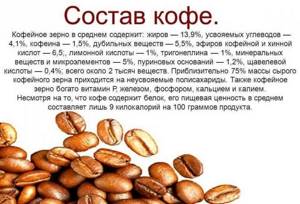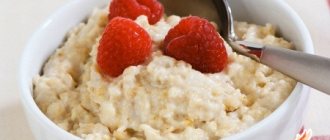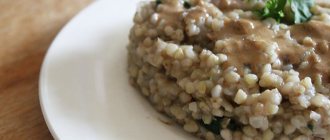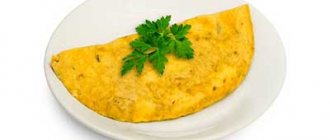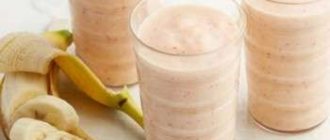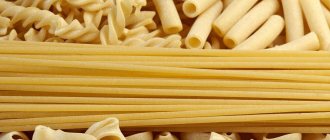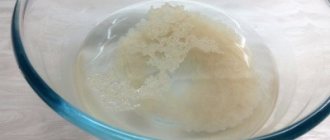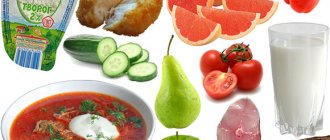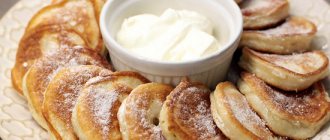Home » Nutrition » Proper nutrition » How many calories are in a cup of coffee
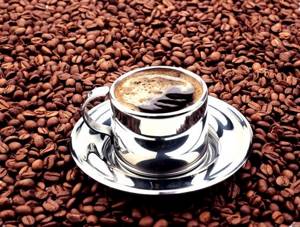
In the modern fast pace of life, when often in the morning and during the day you need to cope with drowsiness and recharge your energy, coffee becomes a good helper. Plus, it's very tasty. People prefer different types and recipes of coffee with different additives. And many are interested in what the calorie content of coffee with milk is, what is the calorie content of natural black coffee, what is the calorie content of instant coffee. After all, people who carefully monitor the energy value of their diet need to take into account all calories, including those obtained from a variety of drinks. That is why it is necessary to know not only the benefits or harm from drinking coffee, but also the energy value of this popular drink all over the world.
Calorie content of natural coffee
The energy value of dry roasted coffee beans ranges from 230 to 330 kcal per 100 grams, depending on the variety. To prepare a serving of espresso, take 1 tablespoon of ground product, that is, approximately 10 grams. This means that one dose contains from 23 to 33 kcal. However, the calorie content of coffee without sugar and milk is not at all as high as it seems at first glance.
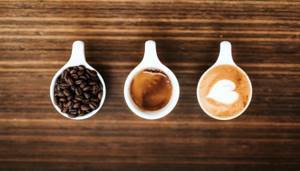
Coffee beans contain fats, carbohydrates and even proteins. During brewing, they only partially pass into the drink. The finer the grains are ground, the better the extraction. Fine grinding releases slightly more substances than coarse grinding. This has a slight effect on the final calorie content.
On average, a serving of espresso (30 ml) contains 1 kcal. Accordingly, a double espresso has 2 kcal.
A cup of Turkish coffee (200 ml) contains 3-4 kcal. The same amount of product is used to make it, but there are more nutrients in the drink due to longer cooking time and fine grinding.
During storage, the aromatic oils partially evaporate and the calorie content decreases slightly. It turns out that freshly roasted grains have the highest calorie content. But the difference is only 1 kcal per serving, so you shouldn’t give up fresh product for fear of damaging your figure. The same applies to the choice of grain type: Arabica is slightly more nutritious than Robusta (the difference is 0.5-1 kcal per serving) due to the higher content of aromatic substances.
- Read more: Arabica and Robusta - what is the difference
Sugar-free espresso is suitable for those who want to lose weight, because it hardly increases daily caloric intake and at the same time speeds up metabolism.
Flavored grains are twice as nutritious, but this means a difference of 2 kilocalories per serving that is insignificant for the daily diet.
How many calories are in a cup of coffee?
Coffee beans are rich in essential oils, enzymes, fats, and carbohydrates. After coffee beans are roasted, their fat levels are reduced, and the amount of carbohydrates and proteins does not change much. As a result, their nutritional and energy value tends to zero.
When adding sugar or honey to coffee, many people do not even realize how rapidly the energy value of their drink increases.
The following must be taken into account: the longer the water is in close contact with the coffee powder, and the less the amount of water per cup of coffee, the higher the calorie content of the drink. For example: - a cup of espresso coffee contains only 1-2 calories; - a cup of double espresso - 4 calories; — 250 ml of Americano coffee contains 2 calories; - 100 ml of Turkish coffee - 12 calories; — cappuccino – 75 calories; - frappuccino - 215 calories; - mocha - 165 calories.
Soluble product
Even without added sugar and milk, a drink made from granules or freeze-dried crystals has more calories than brewed coffee. The instant product contains practically no caffeic acids, fats, proteins and even caffeine, because it consists of only 15-20% of original natural raw materials. The rest is stabilizers, thickeners, and dyes. These additives make instant coffee more nutritious: on average, it contains from 6 to 12 kcal per one heaped teaspoon.
However, this indicator can vary greatly between different manufacturers. For example, a serving of Nescafe Gold contains only 4.5 kcal, but the same amount of Tchibo Exclusive contains as much as 20.
The nutritional value of instant coffee without sugar is 5-10 times higher than that of a product of natural origin.
Cafein free
Decaf is made from beans that have undergone special processing to remove caffeine. It is intended for individuals who, for certain reasons, must limit or eliminate their caffeine intake.
We invite you to find out the whole truth and essence of decaffeinated coffee with Yulia Chekhonina, a nutritionist at the clinic of the Institute of Nutrition of the Russian Academy of Medical Sciences, Ph.D. and Dr. Agapkin.
It tastes slightly different from regular coffee and has a less pronounced aroma, so many will not be able to notice the difference.
Pros:
- improves memory;
- It is allowed to be used by hypertensive patients and those with heart disease. It does not cause heart palpitations or increase blood pressure;
- reduces the risk of developing diabetes;
- you can drink more;
- has a positive effect on brain activity.
Pregnant women are allowed to use. Such a drink will not harm the fetus. It will not add extra pounds to overweight people, as it is practically calorie-free.
Nutritional value in 1 mug:
- fats – 0 g;
- proteins – 0.24 g;
- carbohydrates – 0.24 g;
- 2 kcal.
The drink contains a small amount of caffeine, which is not harmful to health. But with excessive, constant use, the same side effects can occur as when using regular coffee.
With sugar
There are 15 kilocalories in 1 level teaspoon of sugar (about 5 grams). The same amount in one cube of refined sugar. Adding two servings of sweetness significantly increases the calorie content of a coffee cup: from 1-4 kilocalories to 30-34.
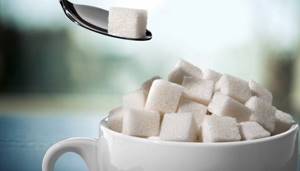
Sweet flavored syrups, which are sometimes used instead of granulated sugar, are no less nutritious. In 10 grams (the same 2 teaspoons) - from 30 to 40 kcal.
Contraindications
Certain people should not drink coffee with milk. Among the contraindications to its use are:
- stomach diseases;
- hypertension;
- pathologies of the heart and blood vessels;
- disorders of the nervous system;
- osteoporosis;
- acute renal failure;
- sleep disorders;
- individual lactose intolerance and problems with its absorption;
- children;
- elderly people.
Consumption of coffee drinks should be minimized during pregnancy and breastfeeding
Among the many coffee drinks, those that contain dairy products are especially popular. This is due to their excellent taste. The coffee turns out incredibly gentle and does not have an overly powerful effect on the body. You just need to remember that even in this case you should not consume it in large quantities.
With milk and cream
The calorie content of dairy products depends on the fat content. The most dietary option is skim milk (0.1% fat). There are only 30 kcal in 100 grams, and 6 in a serving (20 ml). The most popular product is with a fat content of 3.5%. It is twice as nutritious - 60 kcal per 100 grams, or 12 per serving. And 6% fat milk is as much as 85 kcal per 100 grams, that is, 17 per serving.
The calorie content of coffee with milk without sugar can be significantly reduced if you choose a product with minimal fat content.
If you prepare the drink in a Turk, then 200 ml of coffee with milk without sugar is 15 kcal.
Coffee with cream is very tasty, but also very high in calories. Liquid 10% cream contains 120 kcal per 100 grams. If you add only 10 ml per cup, the energy value will increase by 12 kcal.
The energy value of instant coffee with milk (3.5%) is on average 20 kilocalories per 200 ml serving.
Benefits and harms
It is prohibited to give the drink to children. It has a powerful stimulating effect on the central nervous system. The developing children's brain is particularly susceptible to the effects and toxic effects may occur.

Photo: www.koolinar.ru
Positive traits:
- blood supply improves;
- strengthens the heart muscle;
- cholesterol levels decrease;
- the nervous system tolerates stress more easily;
- the mood rises;
- the hormone of joy – serotonin – is produced;
- the likelihood of developing chronic diseases is reduced: stage 2 diabetes and Parkinson’s;
- the reaction speed increases;
- memory improves;
- metabolism accelerates, so excess weight disappears faster;
- useful for hypotension, as it increases blood pressure.
Not recommended for use by persons with:
- high blood pressure;
- glaucoma;
- insomnia;
- coronary heart disease;
- renal failure.
Not allowed:
- elderly people;
- pregnant women;
- children;
- nursing;
- with individual intolerance;
- for diabetics.
It is not recommended to take after a heavy lunch and especially on an empty stomach. It is best to treat yourself to a flavorful drink after a light breakfast. Use in the evening may cause insomnia. It is not recommended to drink more than three glasses a day.
The healthiest ones include only coffee prepared from fresh beans . Decaffeinated coffee is purified using organic solvents, which create dangerous chemical compounds that are harmful to health. May provoke the development of cancer.
The most harmful is 3 in 1 coffee. The drink contains an excessive amount of sugar and it will enter the body in excess. It also contains cream, an animal fat that is harmful to a healthy diet.
Video about the dangers of instant coffee from a certified personal trainer and nutrition specialist.
With sugar and milk
Coffee with milk and various coffee and milkshakes, supplemented with granulated sugar or sweet toppings, should not be perceived as drinks, but as a delicacy. A sweet cappuccino or latte with cake is an unaffordable luxury for those watching their weight.

For example, a sweetened cappuccino that is 2/3 milk contains 150 kcal per 200 ml cup.
- More on the topic: Is it possible to drink coffee on a diet?
The calorie content of coffee with milk (20 ml) and sugar (1 teaspoon) is about 30 kcal.
Instant coffee with milk and sugar contains about 50 kilocalories.
Insidious lattes and cappuccinos
Unfortunately, there are not many lovers of plain black coffee. Usually milk, cream and sugar are added to it. This is where the problem lies. Milk and other additives, of course, soften the taste of the drink, making it more refined, but at the same time increase the calorie content tenfold.
So a cup of espresso with added milk contains not two, but thirty-seven calories, and a delicious latte can contain from one hundred eighty to two hundred and fifty calories (depending on the presence or absence of syrup). This can hardly be called a healthy diet drink, given that the recommended calorie intake for a modern person is at just over two thousand, which means that a standard latte will “cover” one tenth of the entire daily diet.
The same applies to cappuccino. A similar, albeit tasty, coffee is milk with syrup and the addition of coffee, which makes it a very high-calorie drink, because it is the milk that “takes on” the main energy value.
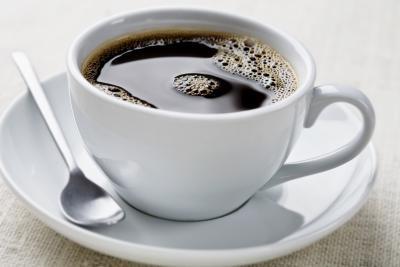
So, if you are watching your figure, it is better to avoid such excesses and opt for espresso and Americano, which is espresso with the addition of water. Interestingly, espresso has less caffeine than many other types of coffee. This is due to the fact that coffee beans are in contact with water for only a short time during the preparation of this drink.
Drink from a bag
The “laziest” method of preparation is a 3-in-1 drink. The bag contains dry vegetable cream, instant coffee, sugar and various additives. One dose, which is recommended to be dissolved in 200 ml of water, contains about 70 kcal.
Calorie table for different coffee drinks
| Coffee, ml | Kcal per 100 grams | Kcal per serving |
| Espresso, 30 | 3 | 1 |
| Ristretto, 15 | 3 | 0,5 |
| Americano, 200 | 0,5 | 1 |
| Natural black, 200 | 2 | 4 |
| Natural with milk, 200 | 7-8 | 15 |
| Natural with milk and sugar, 200 | 15 | 30 |
| Instant black without sugar, 200 | 3-6 | 6-12 |
| Instant with milk without sugar, 200 | 10 | 20 |
| Instant with milk and sugar, 200 | 25 | 50 |
| Coffee from a 3 in 1 bag, ml | 35 | 70 |
Natural, not very sweet coffee with medium-fat milk will not harm your figure, but will be a source of pleasant taste sensations. In addition, in addition to the insignificant 20-30 kilocalories, it contains vitamins and microelements. But a drink from a bag contains a lot of “empty” calories, so it’s better not to drink this product often.
Chemical composition of coffee beans
100 grams of coffee beans contain up to 5 mg of calcium, 2 mg of iron. In addition, it contains nitrogen, phosphorus and sodium, as well as B vitamins and vitamin PP. The latter has a beneficial effect on the vascular system, strengthening the vascular walls and preventing the formation of cholesterol “plaques” on their inner surface.
Coffee beans contain up to 30 organic compounds, both common (apple, coffee) and quite rare (chlorogenic). The beans are rich in caffeine, which is contained here in the range of 0.65 - 2.7%. During the roasting process, the caffeine content increases to at least 1.3%. In the instant version, the caffeine content is even higher and can reach 5%.
